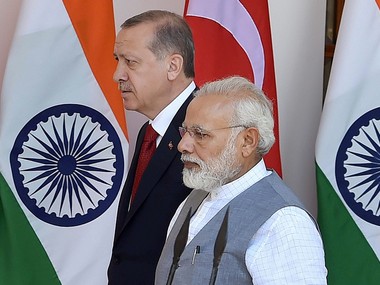An earlier Firstpost article theorised that Turkish President Recep Tayyip Erdoğan’s visit to India has provided “fresh fillip” to India-Turkey relations. Buttressing this point, the author produced two major reasons in his argument: first, the regional contexts in which the two countries — India and Turkey — are working to support each other’s role. Second, Turkey’s “normalised” ties with Israel has a stabilising role in the region, which is key to the India-Turkey relations. [caption id=“attachment_3419772” align=“alignleft” width=“380”] Prime Minister Narendra Modi with Turkish President Recep Tayyip Erdogan. PTI[/caption] While the second factor was clearly at play when Erdoğan visited India since Turkey has signed a reconciliation deal with Israel, the first premise does not stand to scrutiny given the Turkey-Pakistan close relationship. Most surprisingly, many analysts, including the above author, have conveniently skipped the ideological angel of Erdoğan’s visit to India. It is important to unravel as to what political and economic agendas the Turkish President has pursued during his visit to India. But it is equally important to delve deeper into the ideological motives of the current Turkish President in view of his affinity to political Islamism. From an Indian Muslim’s point of view, a far more important question is: how will India tackle the theoretical persuasion of Erdoğan or Erdoğanism for the Muslims? Erdoğan’s global political agenda is referred today as “Erdoğanism”. The deeper ideological roots of Erdoğanism emanate from the Turkish conservatism (muhafazakârlik). Though he calls himself a “conservative democrat”, any form of democracy is not acceptable to him unless it comes under the purview of his Islamist ideologues. Candidly exposing the outcomes of Erdoğanism in the post-secular Turkey, the veteran Turkish journalist, Mustafa Akyol writes in Foreign Policy:
“It is no secret that President Recep Tayyip Erdoğan’s ‘New Turkey’, which was hailed five years ago as the shining model of a Muslim democracy, now looks rather bleak. Turkey makes the news today not because of its domestic reforms and regional ‘soft power’, but because of its increasingly authoritarian regime and frequent terror attacks."
Given this ideological ambition of Erdoğan, the question is: how does Erdoğan’s diplomatic visit to India augur well for the secular and democratic credentials of the country? An earlier article in Firstpost has succinctly answered this: “It is staggering to think that Erdoğan — who wields power as a repressive, paranoid autocrat and has cemented his position through a dubious referendum — has the temerity to lecture a democratic India on ‘human rights’.” In his “lecture” at Jamia Millia Islamia, Erdoğan said that he was delighted to receive the Doctors of Letters from a university which has played a pivotal role not only in India’s freedom movement but also in the Khilafat movement in the 1920s. In fact, Khilafat or Caliphate is the only ideal system of governance for the political Islamists even in this day and age of flourishing democracy. It is not difficult to see why this particular visit is a glad tiding for the Erdoğanists in Turkey and their sympathisers and supporters in India who consider him the future Islamic caliph or amir-ul-mu’minin (chief of the believers). Interestingly, both Recep Tayyip Erdoğan and Narendra Modi hailed the cultural synthesis between the Indian and Turkish communities. While Erdoğan, during his address in Jamia, stressed on “cultural and educational cooperation” as potential areas to advance the Indo-Turkish relations, Modi in his meet with the Turkish President, reiterated his cliché that Sufism is a common ground between Indian and Turkish cultures. In his speech, Modi also referred to Rumi’s notion of tolerance and pluralism celebrating the spiritual synergy between the two countries. But ironically, much against Modi’s expectation, Erdoğan is shifting from the age-old Sufi tradition of Turkey to the modern and attractive fashion of political Islam. Professor Anwar Alam, who has previously taught international relations at Zirve University in Turkey writes: “With his aspiration of becoming a political leader of the Muslim world and in view of his Islamically lashed anti-West polarising discourses, Erdogan is fast becoming a source of Islamic radicalism across the Muslim world.” This is a point that the former National Security Adviser (NSA) Shiv Shankar Menon has also noted in his latest work, Choices: Inside Making of India’s Foreign Policy (2016). In his visit to India, the Turkish president mainly focused on “trade and terror” and said that terrorism has to be fought collectively. “It is unfair to associate terrorism with any specific religion,” he said in his address at Jamia, particularly castigating the Islamic State and Al-Qaeda. Erdoğan, who himself advances the theory of Khilafat or “Islamic caliphate”, lambasts the Islamic State (ISIS)! On the other hand, Erdoğan endorses the religious extremism growing in his country in the grab of political Islam. As a political Islamist leader, he wants his own Islamic state in Turkey. Since the time his party, Justice and Development Party (abbreviated as AKP in Turkish) came to power, Islamism has been employed in Turkey in a brutal way to further the political ends. The Islamist leaders of this Turkish political party profess and practise Islam as an ideology, rather than a spiritual path. Thus, it is self-evident that they will end up with the creation of an Islamic caliphate, sooner or later, which will ultimately eliminate the country’s deep-rooted liberalism and secular democracy. Given this ideological perspective, caution is warranted on the Indian government’s bid to enhance ties with the political Islamist regime of the present-day Turkey.


)

)
)
)
)
)
)
)
)



